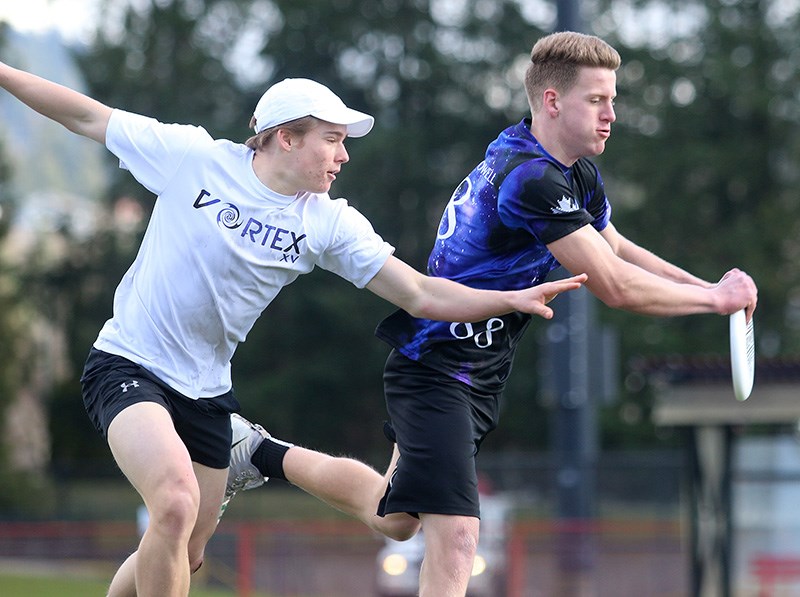A pair of Ultimate players from the Tri-Cities will have to wait a little longer to get to know their teammates on Canada’s national U20 team.
A special four-day training camp that was scheduled to be held at Coquitlam’s Gleneagle secondary school March 19 to 22 has been postponed because of the COVID-19 pandemic
Coquitlam’s Devon Bringeland and Port Coquitlam’s Ricky McLeod are among the 28 Ultimate athletes who will compete for Canada at the 2020 World Junior Ultimate Championships in Malmo, Sweden, July 18 to 25.
Bringeland, who turns 19 this week, said it was Ultimate’s supportive, nurturing spirit that attracted him to the sport when he was in Grade 6 at Stratford Hall, an independent school in Vancouver.
“In Ulitmate, we’re all in it together,” said Bringeland, who’s now studying kinesiology at the University of British Columbia.
McLeod, who’s also 19, said the community vibe of Ultimate is a marked contrast to the negativity he experienced when he was playing competitive soccer.
“Being nice to your opponent is part of this sport,” said McLeod, who finally made the national team after he failed to make in his first attempt a few years ago.
Not that players’ competitive zeal is diminished by their collegial attitude, that’s been a touchstone of the sport since it was invented at a high school in New Jersey in 1968, said the national team’s head coach, Michael Fung.
To get named to Canada’s roster, athletes first had to catch the eye of coaches responsible for selection camps in each of the sport’s regional hubs in Canada — Vancouver, Winnipeg, Metro Toronto and the Ottawa-Gatineau area. Prospective players were tested for their fitness and then run through various drills and scrimmages to showcase their skills. Those who made the cut then attend two training camps prior to worlds to get to know each other and learn how to work together.
“Chemistry is huge in Ultimate,” Fung said, adding each part of the country approaches the sport and its strategies a little differently.
Turning disparate athletes into a cohesive unit when everyone is mostly apart, doing their own thing on club or school teams is an ongoing challenge, he said. Players stay in touch via a Facebook group, they review game recordings and strategy sessions together online, and they share fitness challenges.
“We have to create a platform for them to get to know each other,” Fung said, adding the training camps, that are often based out of someone’s home, can be especially beneficial to achieve that as players have to live, cook, and eat together in close quarters.
He said routine tasks like navigating meal times, cleaning up and sharing bathrooms, as well as planned bonding activities like ping pong and video game tournaments can help develop the synchronicity and communications skills that are vital to success in actual games. It also helps save money as, aside from some small sponsorship to pay for uniforms, everyone on the team pays their own way.
Bringeland said the sacrifices are worth it, especially as the sport’s popularity grows beyond its power base in the United States and Canada; 30 teams will compete in Sweden.
“It’s the next level,” he said of competing at the worlds, which are contested every two years. “It’s what everyone in the sport is driving for, to represent their country.”



